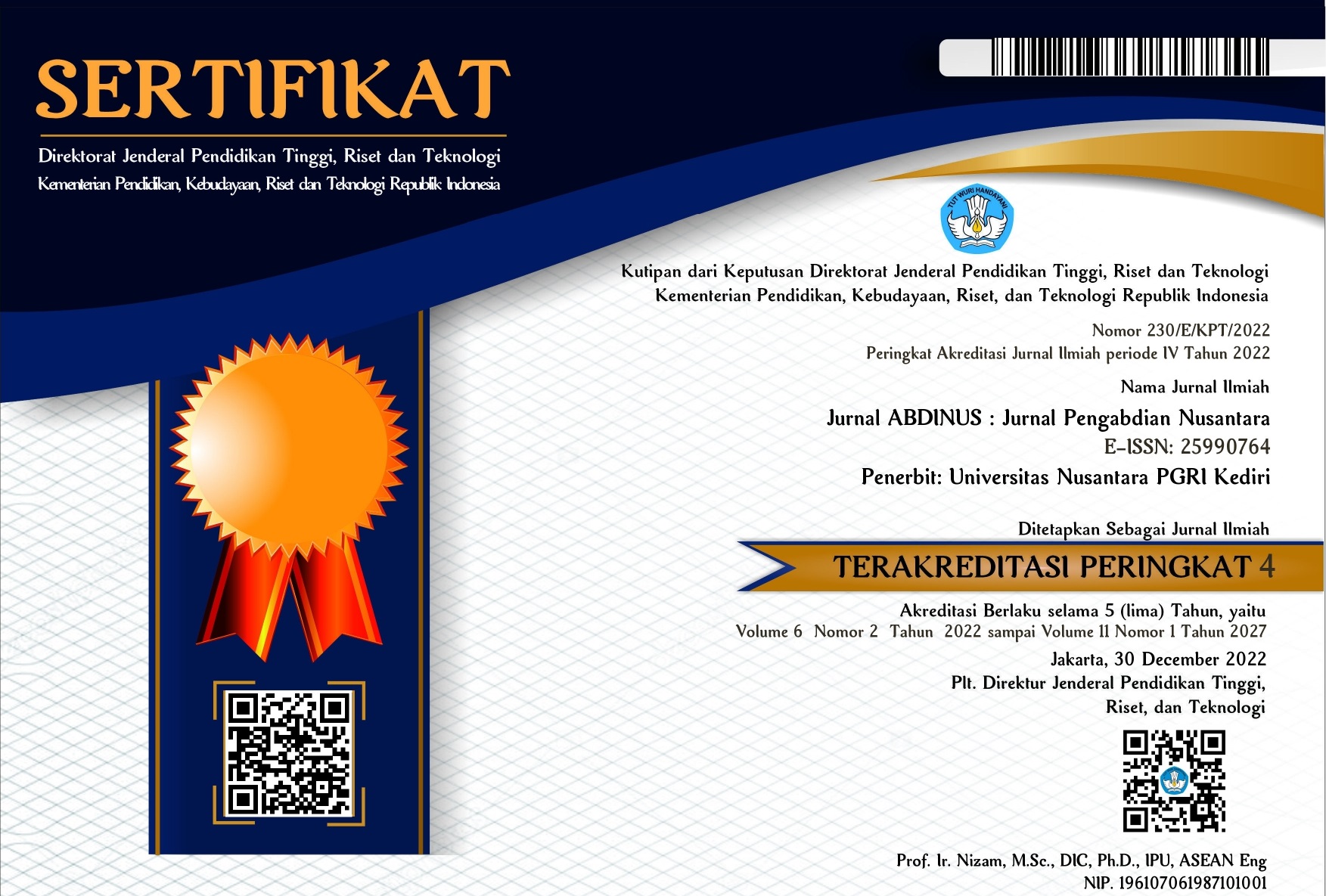Pengolahan Hasil Asesmen dan Penyusunan Rapor untuk Sekolah Penggerak
DOI:
https://doi.org/10.29407/ja.v7i2.19082Keywords:
Assessment, Rapor, Sekolah PenggerakAbstract
Sekolah Penggerak are schools that are required to implement the Kurikulum Merdeka. One obstacle that Sekolah Penggerak experienced in implementing the Kurikulum Merdeka is the low competence of school principals and teachers in compiling and processing assessment results and report cards. Workshops are a relatively effective way of developing the competence of school principals and teachers. Therefore, this service aims to strengthen the competence of school principals and teachers regarding assessments and report cards through workshop activities. The workshop was also chosen because it involves direct interaction with participants through relevant worksheets. The participants of the workshop were eighteen people consisting of three junior high school principals, three high school principals, six teachers of the junior high school, and six teachers of the high school who were members learning committee. Workshop activities are carried out for eight lesson hours using worksheets from the government. Data were analyzed using qualitative data analysis. The dedication results show that the workshop activities are going well, especially the discussion activities. Although, the time allocation for activities tends to be more. In general, each school has been able to prepare assessments well, although it is still constrained in making criteria for achieving learning objectives. In addition, the assessment editor designed by the school still needs to be more optimal because there are still schools that compile an assessment rubric for that section. Likewise, when processing the assessment results, it was found that schools needed to be able to formulate a formula to determine student scores. In contrast to the previous results, when participants compiled report cards, information was obtained that all schools could prepare report cards properly, including in compiling descriptions related to student competency achievements.
Downloads
References
Ach Rasyad, A., Budi Wiyono, B., & Arina, R. (2020). An analysis of workshop program implementation and competency improvement for adult education facilitators in Indonesia. International Journal of Innovation, Creativity and Change, 10(10), 609–623. www.ijicc.net
Alfath, K., & Raharjo, F. F. (2019). Teknik pengolahan hasil asesmen: Teknik pengolahan dengan menggunakan pendekatan acuan norma (pan) dan pendekatan acuan patokan (pap). Jurnal Komunikasi Dan Pendidikan Islam, 8(1), 1–28. https://journal.staimsyk.ac.id/index.php/almanar/article/download/105/100
Almubarak, M., & Rahmat. (2021). Tehnik pemeriksaan dan pengolahan hasil asesmen. Jurnal Pendidikan Islam, 4(1), 110–128. http://dx.doi.org/10.32529/al-ilmi.v4i1.916
BSKAP. (2022). Panduan pembelajaran dan asesmen: Pendidikan anak usia dini, pendidikan dasar, dan menengah. BSKAP. https://kurikulum.kemdikbud.go.id/wp-content/uploads/2022/06/Panduan-Pembelajarn-dan-Asesmen.pdf
CERI. (2008). Assessment for learning: Formative evaluations. OECD/CERI International Conference “Learning in the 21st Century: Research, Innovation and Policy,” 46(4), 85–96. https://doi.org/10.1097/AIA.0b013e31818623df
Cox, G. C., Morrison, J., & Brathwaite, B. (2015). The rubric: An assessment tool to guide students and markers. 1st International Conference on Higher Education Advances, HEAd’15, 26–32. https://doi.org/10.4995/head15.2015.414
Cullinane, A. (2011). Formative assessment classroom techniques. Resource & Research Guides, 2(13), 13–2011. https://www.researchgate.net/publication/283328368
Dinata, F. R. (2020). Teknik pengolahan hasil asesmen pendidikan agama islam. Al-Hikmah Way Kanan: Jurnal Media Pendidikan, Kependidikan Dan Sosial Kemasyarakatan, 1(1), 1–24. https://alhikmah.stit-alhikmahwk.ac.id/index.php/awk/article/view/2
Elvianasti, M., Roza, L., Anugerah, D., Maesaroh, M., & Irdalisa, I. (2021). Melatih Keterampilan Pedagogi Umum Guru MGMP IPA Jakarta Utara Pasca Covid-19. Jurnal ABDINUS : Jurnal Pengabdian Nusantara, 5(2), 208–213. https://doi.org/10.29407/ja.v5i2.14714
Gloria, R. Y., Sudarmin, S., Wiyanto, & Indriyanti, D. R. (2018). The effectiveness of formative assessment with understanding by design (UbD) stages in forming habits of mind in prospective teachers. Journal of Physics: Conference Series, 983(1). https://doi.org/10.1088/1742-6596/983/1/012158
Ikhsanudin, & Subali, B. (2020). Content validity analysis of first semester formative test on biology subject for senior high school. Journal of Physics: Conference Series, 1097(September), 1–9. https://doi.org/10.1088/1742-6596/1097/1/012039
Isnawan, M. G., & Sudirman, S. (2022). Principal competency model development: Phenomenological design with coaching techniques in Sekolah Penggerak. Jurnal Keilmuan Manajemen Pendidikan, 8(01), 59–68. https://doi.org/10.32678/tarbawi.v8i01.5867
Khan, T., Hande, S., Bedi, S., Singh, T., & Kumar, V. (2012). Learning objectives. International Journal of User-Driven Healthcare, 2(3), 44–62. https://doi.org/10.4018/ijudh.2012070105
Miles, M. B., Huberman, A. M., & Saldana, J. (2014). Qualitative data analysis: A methods sourcebook. SAGE Publications, Inc. https://id.id1lib.org/book/3593988/83e08f
OECD. (2008). Assessment for learning: Formative assessment. https://www.oecd.org/site/educeri21st/40600533.pdf
Patilima, S. (2021). Sekolah penggerak sebagai upaya peningkatan kualitas pendidikan. Merdeka Belajar Dalam Menyambut Era Masyarakat 5.0, 228–236. https://ejurnal.pps.ung.ac.id/index.php/PSNPD/article/download/1069/766
Pusat Penelitian Kebijakan Badan Penelitian dan Pengembangan dan Perbukuan. (2020). Naskah akademik program sekolah penggerak. Pusat Penelitian Kebijakan Badan Penelitian dan Pengembangan dan Perbukuan. https://poltekbaubau.ac.id/images/dokumen/Naskah-Akademik-SP-dikompresi.pdf
Ristiyani, Rokhman, F., Rustono, & Pritiwati, R. (2020). The evaluation of learning objectives in Indonesian language lesson plans in the 2013 curriculum for class X senior high school level. The 6th International Conference on Science, Education and Technology , 673–677. https://www.atlantis-press.com/article/125964367.pdf
Septyara, S. &, & Anggraeni, D. (2017). Pelaksanaan program workshop “belajar efektif” untuk orang tua. Jurnal Ilmiah VISI PGTK PAUD dan DIKMAS, 12(2). https://media.neliti.com/media/publications/259992-pelaksanaan-program-workshop-belajar-efe-e164e193.pdf
Sewagegn, A. A. (2020). Learning objective and assessment linkage: Its contribution to meaningful student learning. Universal Journal of Educational Research, 8(11), 5044–5052. https://doi.org/10.13189/ujer.2020.081104
Sudanta, I. W. (2015). Efektivitas kegiatan workshop dalam meningkatkan kemampuan menetapkan kriteria ketuntasan minimal (kkm). Dharmasmrti, XIII(26), 75–84. https://ejournal.unhi.ac.id/index.php/dharmasmrti/article/download/49/28/
Suminar, D. Y. (2022). Penerapan video interaktif alur merrdeka untuk meningkatkan kemampuan bernalar kritis di SMAN 10 Pontianak. Jurnal Pembelajaran Prospekti, 7(1), 34–39. https://jurnal.untan.ac.id/index.php/lp3m/article/view/55057/75676593326
Syafi’i, F. F. (2021). Merdeka belajar: Sekolah Penggerak. Prosiding Seminar Nasional Pendidikan Dasar “Merdeka Belajar Dalam Menyambut Era Masyarakat 5.0” 2021, 39–49. https://ejurnal.pps.ung.ac.id/index.php/PSNPD/article/download/1049/743
Wolf, K., & Stevens, E. (2007). The role of rubrics in advancing and assessing student learning. The Journal of Effective Teaching, 7(1), 3–14. https://files.eric.ed.gov/fulltext/EJ1055646.pdf















